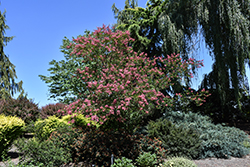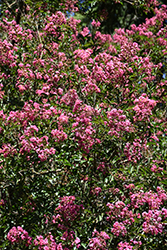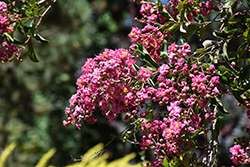It's all about ...
plants

Pecos Crapemyrtle
Lagerstroemia indica 'Pecos'
Height: 12 feet
Spread: 10 feet
Sunlight:
![]()
![]()
Hardiness Zone: 7a
Other Names: Crape Myrtle, Crepe Myrtle
Description:
This remarkable crapemyrtle produces large trusses of frilly pink blooms over shiny dark green foliage; excellent mildew resistance and improved hardiness; a captivating focal point in the garden or border; can be maintained as a small, multi-stemmed tree
Ornamental Features
Pecos Crapemyrtle is clothed in stunning panicles of pink frilly flowers at the ends of the branches from mid summer to early fall, which emerge from distinctive coppery-bronze flower buds. It has attractive dark green foliage with grayish green undersides. The glossy oval leaves are highly ornamental and turn outstanding shades of orange, rose and deep purple in the fall. The smooth gray bark and purple branches add an interesting dimension to the landscape.
Landscape Attributes
Pecos Crapemyrtle is a dense multi-stemmed deciduous shrub with an upright spreading habit of growth. Its relatively fine texture sets it apart from other landscape plants with less refined foliage.
This is a relatively low maintenance shrub, and is best pruned in late winter once the threat of extreme cold has passed. It has no significant negative characteristics.
Pecos Crapemyrtle is recommended for the following landscape applications;
- Accent
- Mass Planting
- Hedges/Screening
- General Garden Use
- Container Planting
Planting & Growing
Pecos Crapemyrtle will grow to be about 12 feet tall at maturity, with a spread of 10 feet. It has a low canopy with a typical clearance of 1 foot from the ground, and is suitable for planting under power lines. It grows at a medium rate, and under ideal conditions can be expected to live for approximately 20 years.
This shrub does best in full sun to partial shade. It prefers to grow in average to moist conditions, and shouldn't be allowed to dry out. It is very fussy about its soil conditions and must have rich, acidic soils to ensure success, and is subject to chlorosis (yellowing) of the foliage in alkaline soils. It is highly tolerant of urban pollution and will even thrive in inner city environments. This is a selected variety of a species not originally from North America.
Pecos Crapemyrtle makes a fine choice for the outdoor landscape, but it is also well-suited for use in outdoor pots and containers. Its large size and upright habit of growth lend it for use as a solitary accent, or in a composition surrounded by smaller plants around the base and those that spill over the edges. It is even sizeable enough that it can be grown alone in a suitable container. Note that when grown in a container, it may not perform exactly as indicated on the tag - this is to be expected. Also note that when growing plants in outdoor containers and baskets, they may require more frequent waterings than they would in the yard or garden. Be aware that in our climate, most plants cannot be expected to survive the winter if left in containers outdoors, and this plant is no exception. Contact our experts for more information on how to protect it over the winter months.
This plant is not reliably hardy in our region, and certain restrictions may apply; contact the store for more information.


